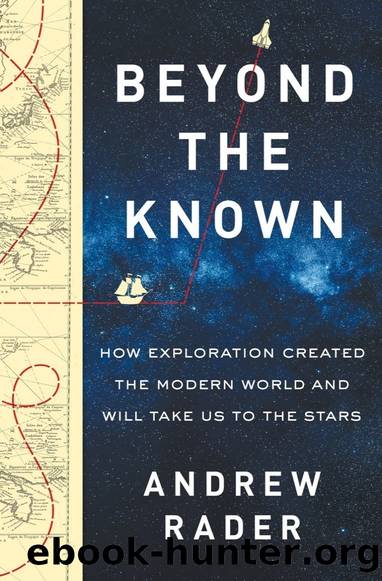Beyond the Known: How Exploration Created the Modern World and Will Take Us to the Stars by Andrew Rader

Author:Andrew Rader [Rader, Andrew]
Language: eng
Format: epub
ISBN: 9781982123536
Google: ADoEEAAAQBAJ
Amazon: 1982123532
Barnesnoble: 1982123532
Goodreads: 43822485
Publisher: Scribner
Published: 2019-11-12T00:00:00+00:00
17 | TO THE SKY
Itâs truly remarkable that creatures who, until recently in evolutionary history, never traveled faster than a running pace or built more than rudimentary tools are today able to operate motor vehicles and create networks that span the globe. We developed the technology to design, build, and operate airplanes over a century ago, but thereâs still something mysterious, even unnatural, about them. Weâre so used to flying that we donât often think about how incredible it is that platforms of metal, supported by nothing more than curved protrusions directing airflow, can carry over a million pounds of structure, fuel, passengers, and luggage.I When we do ponder it, those of us who lack a close acquaintance with the principles of differential pressure can become nervous. But despite our apprehension, air travel is remarkably safe.
If you want proof of this, just look at the long lines of planes waiting to land at any major airport. On average, thereâs less than one major accident per month around the world, out of more than three million commercial flights. Youâre more than eighty times more likely to be killed in a car crash than in an airline accident. Even on the worst airlines in the world, your chance of being killed is less than your chance of winning the lottery (one in two million)âand the best airlines are far safer. Part of the safety is inherent. Danger in transportation stems from the potential to impact objects, which causes our bodies to decelerate faster than they can tolerate. Flying involves far more separation from potential obstructions, thus more reaction time. Being higher actually makes you safer.
The fundamental physics of flying means that airplanes can glide over long distances. A Boeing 747 has a glide-slope ratio of 15:1, meaning that from cruising altitude it could glide for a hundred miles, even if all its engines fell off. And engines fail vanishingly rarely, once every several million flight hours. Most planes can fly on a single engine, and losing all engines on a multiengine aircraft happens, somewhere in the world, no more than once every few years. Part of this reliability is due to extraordinary tests we subject engines to. We run them through temperature extremes; dump torrents of water, ice, and snow into them at up to eight hundred gallons per minute; and fire debris (including frozen chickens) at them with cannons. Theyâre tough. Frequent inspections catch mechanical issues long before they become a problem, and even if one is missed, aircraft have redundant systems that allow them to fly with significant damage.
Additional safety comes from the design of airplanes, which can safely withstand G-forces that would terrify passengers. Itâs virtually impossible for an airplane to be damaged by turbulence: in fact, turbulence has never resulted in an airliner crash.II Engineers calculate what forces a structure should tolerate by assuming the absolute worst-case conditions and then pile safety factors on top of that. The size of these factors varies by structure: bridges and buildings
Download
This site does not store any files on its server. We only index and link to content provided by other sites. Please contact the content providers to delete copyright contents if any and email us, we'll remove relevant links or contents immediately.
| Civilization & Culture | Expeditions & Discoveries |
| Jewish | Maritime History & Piracy |
| Religious | Slavery & Emancipation |
| Women in History |
Cecilia; Or, Memoirs of an Heiress — Volume 1 by Fanny Burney(32547)
Cecilia; Or, Memoirs of an Heiress — Volume 2 by Fanny Burney(31945)
Cecilia; Or, Memoirs of an Heiress — Volume 3 by Fanny Burney(31931)
The Secret History by Donna Tartt(19053)
Sapiens: A Brief History of Humankind by Yuval Noah Harari(14368)
Leonardo da Vinci by Walter Isaacson(13316)
The Radium Girls by Kate Moore(12018)
Sapiens by Yuval Noah Harari(5366)
How Democracies Die by Steven Levitsky & Daniel Ziblatt(5215)
The Wind in My Hair by Masih Alinejad(5092)
Homo Deus: A Brief History of Tomorrow by Yuval Noah Harari(4908)
Endurance: Shackleton's Incredible Voyage by Alfred Lansing(4769)
Man's Search for Meaning by Viktor Frankl(4583)
The Silk Roads by Peter Frankopan(4526)
Millionaire: The Philanderer, Gambler, and Duelist Who Invented Modern Finance by Janet Gleeson(4465)
The Rape of Nanking by Iris Chang(4203)
Joan of Arc by Mary Gordon(4101)
The Motorcycle Diaries by Ernesto Che Guevara(4089)
Stalin by Stephen Kotkin(3957)
